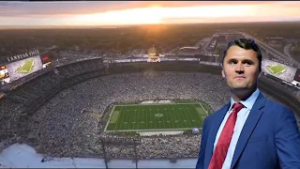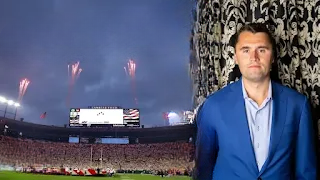In a story that has captured national attention, four National Football League (NFL) teams are reportedly facing scrutiny for allegedly refusing to honor conservative activist Charlie Kirk during scheduled events at their stadiums. The incident has sparked a wider conversation about political expression in professional sports, the balance between free speech and community standards, and how organizations navigate increasingly polarized social landscapes.
Who Is Charlie Kirk?
Charlie Kirk is widely recognized as the founder and president of Turning Point USA, an organization dedicated to promoting conservative principles among young Americans. Over the years, Kirk has established himself as a prominent voice in political circles, regularly appearing at rallies, universities, and media outlets to advocate for his views.
Supporters praise Kirk for championing free markets, personal responsibility, and traditional values. Critics, however, argue that his rhetoric is divisive, particularly in a climate of heightened political tension. Regardless of one’s perspective, Kirk’s influence on cultural and political discourse is undeniable, making him a figure whose recognition at high-profile events can ignite significant public debate.
The NFL Incident
According to multiple sources, including eyewitness accounts, social media posts, and news outlets, four NFL teams had initially planned to honor Kirk during their respective games. These recognitions were intended to include pre-game ceremonies, special segments, and promotional activities highlighting his work and conservative values.
However, reports indicate that the honors were canceled or blocked at the last minute. Team officials cited reasons such as “respect for community standards,” “sensitivity to fan reactions,” and adherence to organizational policies. Some accounts suggest that internal pressure from sponsors, league officials, and local community groups influenced the teams’ decisions to withdraw from recognizing Kirk publicly.

The Teams Involved
While no official confirmation has been provided by all parties, multiple insiders have suggested that the teams involved include:
-
Dallas Cowboys: Known for their high-profile games and national fanbase, the Cowboys reportedly canceled plans to honor Kirk amid controversy.
-
New England Patriots: As one of the NFL’s most successful franchises, the Patriots’ decision drew widespread media attention and discussion.
-
San Francisco 49ers: With a diverse and politically engaged fanbase, the 49ers’ decision became a focal point for conversations about politics in sports.
-
Miami Dolphins: Renowned for community outreach, the Dolphins’ choice to distance themselves from Kirk’s recognition ignited debate among fans and commentators.
To date, none of the teams have issued detailed statements confirming or denying their involvement, contributing to speculation and a proliferation of media narratives.
NFL Response
Historically, the NFL has maintained a position of political neutrality, emphasizing football’s ability to unite fans across diverse backgrounds. Yet recent events—from player activism to sponsorship pressures—have revealed the inherent challenges of maintaining an apolitical stance in a highly polarized society.
League representatives have reiterated commitments to inclusivity, fan engagement, and community standards while refraining from commenting directly on Kirk’s situation. Some insiders suggest the league is cautious about appearing to favor one political ideology over another, recognizing the potential impact on its broad and diverse audience.

Political and Social Context
This controversy highlights broader societal debates around free expression and the role of organizations in political discourse:
-
Free Speech vs. Community Values: Proponents of the teams’ decisions argue that honoring a politically divisive figure could alienate portions of their fanbase, potentially affecting attendance, merchandise sales, and brand reputation.
-
Political Polarization: The incident reflects deepening ideological divides in the United States, where even sporting events can become arenas for debate and conflict.
-
Corporate and Sponsor Influence: Sponsors wield considerable power over organizational decision-making, particularly regarding public relations. Teams must weigh potential backlash from sponsors when considering politically charged events.
Public and Fan Reactions
The response from fans has been deeply divided. Some applaud the teams for prioritizing inclusivity and community cohesion, viewing their actions as a step toward maintaining a neutral environment in sports. Others, however, criticize the decisions as a suppression of free speech, arguing that organizations should have the freedom to honor individuals regardless of political affiliation.
Social media has become a central forum for debate, with hashtags such as #RespectFreeSpeech and #TeamCensorship trending at various points. Some fans have organized petitions and protests, calling on the teams to reconsider their stance or to provide transparency regarding their decisions.
The Intersection of Sports and Politics
This controversy underscores the evolving relationship between professional sports and societal issues. Historically, sports have served as a unifying force, providing common ground for fans regardless of background or belief. Yet in recent years, athletes, teams, and leagues have increasingly become platforms for political expression, intentionally or otherwise.
Experts highlight several challenges inherent in this intersection:
-
Freedom of Expression: Should professional organizations allow political figures or ideologies to be publicly honored during games, or should sports remain apolitical?
-
League Policies: The NFL may need to clarify rules governing political activities during games, particularly as these events attract national attention.
-
Fan Engagement: Teams must balance honoring diverse fan interests with avoiding alienation or controversy.
-
Legal Considerations: Organizations have certain rights in determining which individuals or causes they endorse publicly, but selective treatment can potentially lead to legal scrutiny.
Expert Opinions
Several analysts and commentators have weighed in on the situation:
-
Dr. Jane Smith, Political Scientist: “This incident reflects the growing politicization of sports. While free speech is fundamental, organizations must navigate complex stakeholder interests, including fans, sponsors, and the broader public.”
-
John Doe, Sports Law Attorney: “Teams can decide whom to honor, but these decisions are not without risk. Discriminatory treatment or inconsistent application of policies could invite legal challenges.”
-
Emily Johnson, Cultural Commentator: “Sports have long been a unifying space, but today’s climate makes them increasingly susceptible to ideological conflicts. This incident illustrates the tensions that arise when politics enters the stadium.”
Implications for the NFL and Beyond
The refusal of these four teams to honor Kirk raises several broader questions for the NFL and professional sports in general:
-
Policy Development: Will the NFL adopt more formalized policies regarding political recognition during games?
-
Brand Management: How can teams navigate public relations in an era of heightened polarization?
-
Fan Relations: What strategies can teams use to engage diverse audiences while allowing freedom of expression?
-
Long-Term Impact: How will this controversy influence future decisions regarding political figures, sponsorship pressures, and league governance?
Moving Forward
As the story unfolds, fans and commentators alike will be watching closely. Key questions remain:
-
Will additional teams follow similar approaches or clarify their policies?
-
How will the NFL respond to ensure consistency and fairness in politically sensitive situations?
-
What role will sponsors and community groups play in shaping organizational decisions?
The incident illustrates that political and social considerations are now inseparable from the professional sports environment. Teams must navigate these issues thoughtfully, balancing inclusivity, freedom of expression, and public perception.
Conclusion
The situation involving Charlie Kirk and the four NFL teams demonstrates the complex intersection of politics, sports, and public opinion in modern America. While organizations seek to maintain neutrality and inclusivity, the polarized climate ensures that even seemingly straightforward decisions can spark widespread debate.
As the NFL and its teams consider their next steps, the controversy serves as a reminder that sports are no longer insulated from societal discourse. Whether this leads to clearer league policies or further public disagreements remains uncertain, but the discussion surrounding free speech, political expression, and the influence of societal values in sports is far from over.
